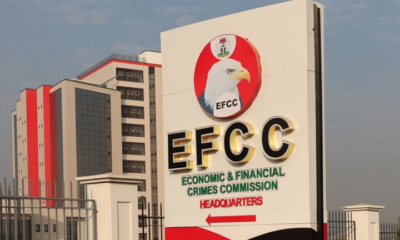Crime
FG Approves New Whistle-blower Bill

The Federal Government, on Wednesday, approved a new Whistle Blower draft bill.
It also lamented that the existing Whistle-blowing policy launched on December 21, 2016, is “losing momentum.”
The Minister of Finance, Budget and National Planning, Dr Zainab Ahmed, disclosed this to State House Correspondents after this week’s Council meeting, chaired by Vice President Yemi Osinbajo, at the Aso Rock Villa, Abuja.
Launched in December 2016 by the Buhari-led Government, the Whistleblower Protection Act, facilitated through the Federal Ministry of Finance, provides legal cover for individuals who voluntarily expose acts of fraud, bribery, looted government funds and assets, financial misconduct and other forms of corruption.
The policy also rewards a whistleblower who provides information about any financial mismanagement or tipoff about stolen funds to the ministry’s portal with 2.5 – 5 per cent of the funds recovered by the Nigerian government.
Speaking after this week’s FEC meeting, Ahmed said the Council approved the draft bill to strengthen the fight against corruption and protect whistleblowers that provide helpful information to the FG.
She said: “The Ministry of Finance, Budget and National Planning presented several memos today. The first is the draft whistleblower bill for 2022. This memo has been reviewed by the Council and approved with a provision to ensure alignment with the Evidence Act.
“The purpose of operationalising and putting in place a whistleblower bill is to strengthen the fight against corruption and to enable protection for whistleblowers that provide information for use by the government.
“As you know, since 2016, the Council has approved the setting up the Presidential Initiative of Continuous Audit. PICA has been working in partnership with EFCC, ICPC, DSS, and NFIU and the Office of the Attorney-General of the Federation.
“We noticed that the whistleblower policy response has lost momentum. We embarked on engagement in the six geo-political zones, and one of the main outcomes we found is that people are concerned about their safety due to providing information. So, this bill is critical to ensure the effectiveness of the retention of the whistle policy.”
Ahmed also revealed that the Council approved N9.24bn for 2022/2023 Group Life Insurance Cover for civil servants.
This includes government officials in all ministries departments and agencies, paramilitary and intelligence agencies.
According to her, the Head of the Civil Service of the Federation, Dr Folashade Yemi-Esan, presented the memo to the Council.
She said, “The Head of Service of the Federation presented a memo to Council on Group Life Insurance Cover for 2022 to 2023. This insurance coverage covers all government officials in all government agencies, paramilitary and intelligence agencies.
“Council approved the total sum of N9.24bn naira for the insurance cover for 2022 to 2023.
“As you know, the insurance will take effect from the date of payment and in Nigeria, by our laws, the insurance cover is 30 per cent of the annual emolument of any staff of government that is deceased and the insurance company pays this cover to the beneficiaries of the deceased staff”, she said.
The Council also approved the 2022 Finance Bill designed to support the implementation of the 2023 appropriation bill.
Ahmed said: “If you recall, at the public presentation of the budget to the National The minister said the bill has five focus areas: tax equity reforms, climate change and green growth provisions, job creation and economic growth reforms, reforming tax incentives as well as generating revenue-enhancing tax administration.
She explained, “The purpose of the tax equity reforms is to combat tax evasion and aggressive tax planning practices that some companies operating in Nigeria are involved in but also enabling the utilisation of ICT tools and using international best practice to assess taxpayers tax on a fair, reasonable basis.
“The climate change green growth focus will complement non-fiscal reforms designed to reduce greenhouse emissions and facilitate domestic and international investment in climate adaptation, mitigation, and enhance green growth and create jobs.
“The third focus area, job creation and economic growth, is also designed to complement the ease of doing business and other reforms to support capital formation by the private sector as well as to foster enabling business environment for micro, small and medium enterprises for youth as well as women in businesses. It will also help to enhance the performance of businesses in the FinTech, the ICT, entertainment, fashion, sports and the art space.”
Ahmed explained that the fourth tax incentive is to phase out an antiquated pioneer and other tax incentives for mature industries and move a revised set of incentives to real infant industries through economic governance reforms.
She said the FG has also made proposals to reduce tax expenditure equivalent to foregone revenue to support the fiscal space and based on statistics, to gradually transition away from expensive and redundant tax incentives to incentives that reward performance.
The fifth Focus Area of revenue generation and tax administration is to complement the ease of doing business and other reforms that enhance tax administration.
She added that the Finance Bill is amending several fiscal laws, including the capital gains tax, company income tax, customs excise tariff act, Federal Inland Revenue Service act, personal income tax, stamp duties act, tertiary education tax, VAT act, Insurance Act, Nigerian police Trust Fund Act, as well as the National Agency for Engineering Act.
“So with this approval from Council, His Excellency Mr President will convey to the National Assembly a request for the consideration of this bill,” Ahmed said.
According to her, the Council also approved the memo for the design, construction and supply of nine Ballistic Riverine assault boats, as well as nine patrol boats with all associated accessories in favour of Messrs Sewa West African limited in the sum of N689,722,681.30 inclusive of 7.5 per cent VAT for the Nigerian customs service.
Meanwhile, the Minister of State for Budget and National Planning, Clem Agba, said the Council also approved the revised National Social Protection Policy (2021 – 2025) presented by the Minister of Finance and Budget and National Planning.
He said: “This revised national social protection policy is an offshoot of a previous policy that was implemented from 2017 to 2020. The review was carried out in collaboration with all relevant ministries, departments and agencies at the federal and state levels and other key stakeholders, including development partners.
“Recall that when the first policy was in place, there was no ministry like humanitarian affairs, and now we have that ministry. And since it’s part of the review process to do this every four years, the review had to be done.
Agba said the National Social Protection Council would be set up and chaired by the Vice President, with the Secretariat domiciled in the Ministry of Finance, Budget and National Planning.
Its membership will include the ministers of Labour And Employment and Humanitarian Affairs, Disaster Management and Social Development, who will serve as Vice Chair of that Council. The ministers will also co-chair a technical working group.
On his part, the Minister of Power, Abubakar Aliyu, said Council approved the contract for procurement of 20 transformer turns ratio analysers awarded to Segulu Stembek Global Services Ltd, at the sum of N564,231,854.08 with 7.5 per cent VAT with a completion period of four months.
He said, “So, this new technology is more reliable. So, it will be used by the TCN in testing the transformers across the country to know their reliability and detect any faults.”
Crime
Terrorism: Police Neutralises ESN Kingpins, Destroys Camps In Imo

. . . As Operatives Recover Dangerous Weapons, Other Assets
As part of the efforts of the Nigeria Police Force (NPF) to emplace peace and public safety across Nigeria, operatives attached to the Imo State Police Command achieved a significant milestone in the ongoing battle against terrorism.
The feat saw operatives neutralised three deadly terrorist kingpins associated with the Eastern Security Network (ESN), destroyed their camps and recovered weapons.
In a statement on its verified handle on micro-blogging site, X, on Saturday, the NPF wrote, “On January 24, 2025, operatives from the Command’s tactical Unit following credible intelligence launched a coordinated operation aimed at locating and dislodging the terrorist hideouts.
ALSO READ: Lawmaker Introduces Bill To Allow Trump A Third Presidential Run
“The police operatives located the terrorists’ hideout in a forest within Ihube, Okigwe LGA. Upon approach, the operatives came under heavy fire from suspected IPOB/ESN terrorists but demonstrated exceptional courage and engaged the attackers in a fierce gun battle.
“The operation resulted in the neutralization of 6 members of the terrorist group, with 3 being ESN kingpins identified as Ifeanyi Anayo a.k.a. Zuma De Rock (28), Chukwuemeka Odionyenfe a.k.a. Nmimi (22), and Kingsley Sunday (21)— all natives of Ogube, Ihube in Okigwe Local Government Area, and the recovery of five AK-47 rifles, 552 rounds of live ammunition, Improvised Explosive Devices (IEDs), several communication equipment, along with 8 operational motorcycles used by the group.
“Prior investigations had revealed the involvement of the group in several high-profile crimes, including the attack on the Owerri Correctional Center on April 5, 2021, the killing of five policemen in Umunna, Okigwe, on December 12, 2022, and the burning of Arondizuogu Police Station on February 8, 2022.
“The group was also involved in multiple kidnappings, including those of WAEC staff on June 5, 2023, four reverend sisters on August 21, 2022, and four Chinese nationals on December 6, 2023.
“The Inspector-General of Police, IGP Kayode Adeolu Egbetokun, Ph.D., NPM., has commended the gallant operatives for their exceptional display of bravery and coordination.
“The IGP charges police operatives across commands and formations to sustain the tempo and implement the Force’s action plan aimed at reducing crimes drastically in the first quarter of the year 2025.
“The Nigeria Police Force remains unyielding in its goal towards ensuring national security and public safety.
“Members of the public are hereby urged to remain vigilant and work collaboratively with the Nigeria Police Force to promote peace and ensure a safer environment for all citizens.”
Crime
$345,000 Fraud: EFCC Withdraws Arrest Warrant For Mercy Chinwo’s Ex-Manager
The Economic and Financial Crimes Commission (EFCC) has withdrawn the arrest warrant issued against Ezekiel Thankgod, the former manager of renowned gospel singer, Mercy Chinwo.
Biztellers reports that Thankgod is facing allegations of involvement in a $345,000 fraud case.
READ MORE: Bangkok Shuts Over 350 Schools As Air Pollution Reaches Dangerous Levels
The arrest warrant had been issued by Justice Alexander Owoeye of the Federal High Court on January 16, 2025, following an ex parte application by the EFCC seeking to compel Thankgod’s appearance in court.
During a court session on Friday, EFCC counsel, Mrs. Bilikisu Buhari, applied to withdraw the warrant, stating that the charges had already been served on Thankgod’s lawyer, Mr. Monday Ubani, SAN, during open court proceedings.
She argued that the warrant was no longer necessary.
Justice Owoeye granted the application and formally vacated the bench warrant.
Crime
Counsel To Otudeko Protests Alleged N12.3bn Fraud Charges

Oba Otudeko, Chairman of Honeywell Group, appeared in the Federal High Court in Lagos on Monday to challenge charges of N12.3 billion fraud.
Biztellers reports that the Economic and Financial Crimes Commission (EFCC) had filed a 13-count indictment against Otudeko, along with Olabisi Onasanya, former Managing Director of FirstBank Plc., Soji Akintayo, a former board member of Honeywell, and Anchorage Leisure Ltd.
READ MORE: China’s Population Shrinks For Third Year Amid Aging Crisis, Low Birth Rate
During the proceedings, the defendants’ lawyer, Mr. Bode Olanipekun (SAN), raised an objection, stating that the charge had not been properly served to Otudeko or his co-defendants.
Olanipekun emphasized this issue as a reason for protest in court.
The EFCC has accused the individuals and the company of fraudulently obtaining N12.3 billion under false pretenses.
More to follow………..

















